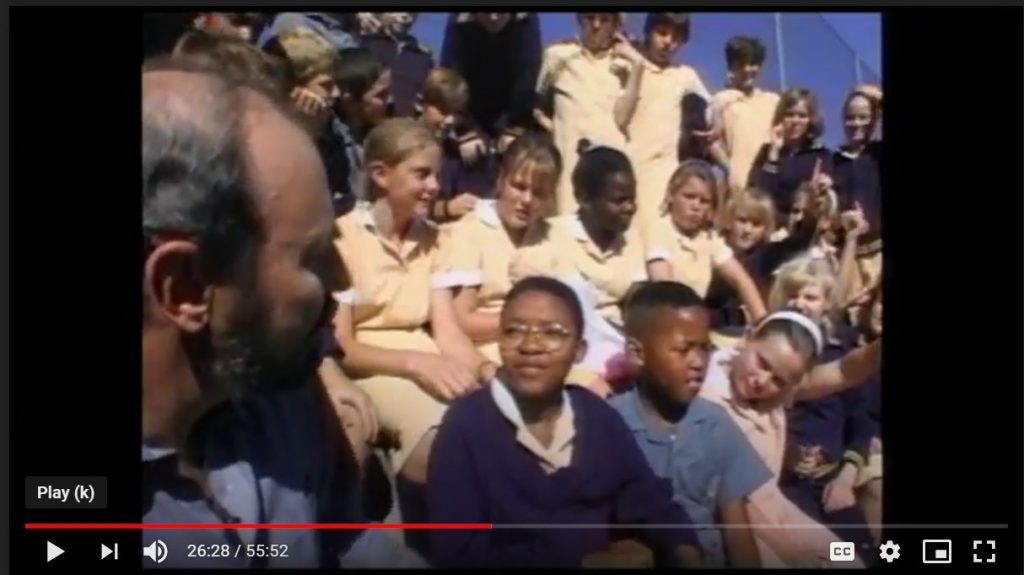By Tug Yourgrau
A few weeks after the election of Nelson Mandela, in early June,1994, filmmaker Joel Olicker and I flew to South Africa to make a documentary about the newly democratic nation. The trip had special meaning to me: I’d lived there until I was 10, when my family immigrated to the US. I’d returned, briefly, only once. Now, along with Joel, my friend as well as colleague, I was going to spend 17 days interviewing Black, White and Brown South Africans about their vision for the future.
The trip was important to me for another reason as well: I was going to visit Joseph Shabalala, the leader of the Zulu men’s choir, Ladysmith Black Mambazo. He and the choir had performed as a “Greek chorus” in my play with music, The Song of Jacob Zulu. I’d collaborated with Joseph on the score, writing lyrics that he set to music. After two sold-out runs at Chicago’s Steppenwolf Theatre, the play had transferred to Broadway in March 1993, where it earned 6 Tony-nominations. It was the first play I’d written; I was on top of the world, imagining a worldwide run. But when the play closed suddenly closed after only a few months, I was bereft. Now, my visit with Joseph seemed a way to stay connected to the magic, to help heal the wounds.
This would also be the first documentary for the new production company that Joel and I had started... He would shoot with a small video camera and I would record sound. Just the two of us, no extra lights, no assistants...
This would also be the first documentary for the new production company that Joel and I had started a few months before. We would be the only crew. We had no money to hire anyone else. He would shoot with a small video camera and I would record sound. Just the two of us, no extra lights, no assistants. We scraped together funding to cover some of our travel and shoot expenses. The rest we put on our credit cards, hoping that, once we had footage to show, we’d find a funder to pay for the editing.
We decided to follow an itinerary of the places where I’d lived as a child, starting in the dry highland metropolis of Johannesburg and ending hundreds of miles southeast in Durban on the Indian Ocean.
It ended up being an extraordinary trip. At times, I felt so overcome by memories that I stood stock still after a session oblivious to the equipment that I was supposed to pack up until Joel called out to me. These are some of the experiences that stand out for me:
- The awareness, as a White man, of being in the racial minority in a country where Black and Brown people constitute the vast majority.
- Visiting my late mother’s sole surviving sibling, Aunt Mickey, at her small apartment in Johannesburg, then traveling with her to the small farming town where she and her siblings had grown up. We arrived a few weeks too late to see her family home; it had been demolished a few weeks earlier.
- Walking in downtown Johannesburg past the bombed-out headquarters of the Mandela’s African National Congress, we get suspicious looks from the young Black men we pass. And no wonder: Joel and I, with our full beards and baseball caps, looked like “Boers,” the white racists militants who’d set off the bomb. But when we approached two Black workers to ask about the bombing, we get a friendly welcome.
- Visiting Rev. Philip Ntombele at his home in the rolling hills of Zululand. Philip and I had become friendly when he studied at Harvard Divinity School. He helped me with Zulu translations for my play. After his shy teenage daughter served us tea and biscuits in the living room, her voice soft and head bowed, Phillip proudly explained that she exhibited traditional “ukuhlonipha” (deference, etiquette).
Later, as we drove with Philip to a small farm in the hills, he told us that he wanted Americans to know that Zulus were not savage, uncivilized people, but kind and welcoming. Joel and I were warmly received by the farmer and his family. Philip translated for us. It turned out that the farmhouse had no running water. One of the daughters had to walk to a far-off stream to draw water then carry the bucket back to the hilltop farm. That exposed her to water-born disease. Phillip was emphatic: these were some of the people that the “New South Africa” had to help.
- A visit to my former home and elementary school in the nearby university town of Pietermaritzburg proved to be one of the most inspiring of the trip. Whites-only when I attended, it now was integrated. When Joel and I interviewed a group of twenty or so pupils — Black, Brown, and White, they were adamant that they all would get along. As one young Black student expressed it: “We’re all the same inside.”
I recalled the racist trope we boys sometimes chanted as we kicked around a soccer ball on the playground... We were being trained to be racists.
Shameful memories also came back. I recalled the racist trope we boys sometimes chanted as we kicked around a soccer ball on the playground “Die wit man moot baas bly.”— “The white man must remain master.” We were being trained to be racists.
- A couple of days later, on the sidewalks around the central bus station in Durban, I walked among homeless women and children, refugees from Black on Black political fighting in Zululand. Later, sitting at an outdoor table near one of the city’s magnificent beaches, I talked with a group of ragged, ravenous Zulu street children for whom I’d bought a meal. A few spoke broken English; I tried my little bit of broken Zulu. They were tough kids, harsh with each other. I saw several of them that evening bumming change and cigarettes on the street. I learned later that the warm weather draws many homeless children here. They sleep on the beach, smoke cigarettes, drink booze, bum change, inhale airplane glue when they can get it — and often get pimped by older boys.
- Visiting Joseph Shabalala, his wife Nelly and their grandchildren at their home in a Black township outside Durban, then going with Joseph to a singing contest at a bleak Zulu migrant worker hostel (dormitory) twenty miles away. It was at contests like this that Ladysmith Black Mambazo made its name. I got the honor of being the judge of the competition, another highpoint of our trip.
- The next day, Joseph and a cousin drove Joel and me to visit Joseph’s mother at the home he’d built for her outside Durban. She greeted us warmly. We taped her singing a lullaby that she’d sung to Joseph when he was a child. It was deeply moving.
This was the place from which he drew inspiration, where he connected with the spirit of his ancestors... an experience of belonging, of having roots, that has been denied to most African-Americans.
- Driving back to Durban from his mother’s house, Joseph and his cousin took us to a nearby valley where his family had lived for many generations, and where he’d grown up grazing his family’s cattle. This was the place from which he drew inspiration, where he connected with the spirit of his ancestors. What Joseph was describing was an experience of belonging, of having roots, that has been denied to most African-Americans, who are cut off from ancestral homes. This gives Black South Africans an especially deep culture of strength and resilience.
The trip having ended, Joel and I flew back to Boston with many hours of tape. WGBH gave us a fine editor, Cob Carlson. We somehow managed to trim all the footage down to an hour. I wrote the script with heavy input from Joel. The New South Africa: A Personal Journey aired on WGBH in Boston and two other PBS stations in the fall of 1994. Several of our TV colleagues wrote moving appreciations to us.
Making the documentary did indeed help me move on from the closing of my play. It gave me a pride in South Africa that I’d never felt before. In my 35 year-long TV career, the program remains one of my favorites.
Tug Yourgrau is an award-winning playwright, director and TV producer. He is also a member of The Writers Studio at FYACS.
See more on Palette.

